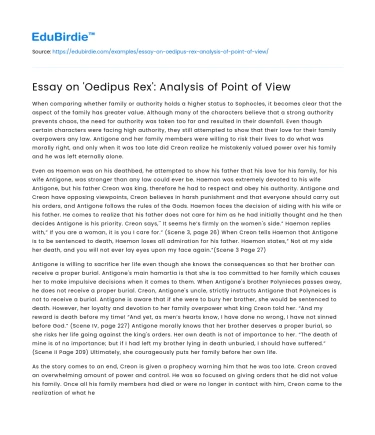When comparing whether family or authority holds a higher status to Sophocles, it becomes clear that the aspect of the family has greater value. Although many of the characters believe that a strong authority prevents chaos, the need for authority was taken too far and resulted in their downfall. Even though certain characters were facing high authority, they still attempted to show that their love for their family overpowers any law. Antigone and her family members were willing to risk their lives to do what was morally right, and only when it was too late did Creon realize he mistakenly valued power over his family and he was left eternally alone.
Even as Haemon was on his deathbed, he attempted to show his father that his love for his family, for his wife Antigone, was stronger than any law could ever be. Haemon was extremely devoted to his wife Antigone, but his father Creon was king, therefore he had to respect and obey his authority. Antigone and Creon have opposing viewpoints, Creon believes in harsh punishment and that everyone should carry out his orders, and Antigone follows the rules of the Gods. Haemon faces the decision of siding with his wife or his father. He comes to realize that his father does not care for him as he had initially thought and he then decides Antigone is his priority. Creon says,'' It seems he’s firmly on the women's side.” Haemon replies with,” If you are a woman, it is you I care for.” (Scene 3, page 26) When Creon tells Haemon that Antigone is to be sentenced to death, Haemon loses all admiration for his father. Haemon states,” Not at my side her death, and you will not ever lay eyes upon my face again.”(Scene 3 Page 27)
Save your time!
We can take care of your essay
- Proper editing and formatting
- Free revision, title page, and bibliography
- Flexible prices and money-back guarantee
Antigone is willing to sacrifice her life even though she knows the consequences so that her brother can receive a proper burial. Antigone's main hamartia is that she is too committed to her family which causes her to make impulsive decisions when it comes to them. When Antigone's brother Polynieces passes away, he does not receive a proper burial. Creon, Antigone's uncle, strictly instructs Antigone that Polyneices is not to receive a burial. Antigone is aware that if she were to bury her brother, she would be sentenced to death. However, her loyalty and devotion to her family overpower what king Creon told her. “And my reward is death before my time! “And yet, as men’s hearts know, I have done no wrong, I have not sinned before God.” (Scene IV, page 227) Antigone morally knows that her brother deserves a proper burial, so she risks her life going against the king's orders. Her own death is not of importance to her. “The death of mine is of no importance; but if I had left my brother lying in death unburied, I should have suffered.” (Scene II Page 209) Ultimately, she courageously puts her family before her own life.
As the story comes to an end, Creon is given a prophecy warning him that he was too late. Creon craved an overwhelming amount of power and control. He was so focused on giving orders that he did not value his family. Once all his family members had died or were no longer in contact with him, Creon came to the realization of what he had done. He finally accepts his defeat, even though it is very hard for him to put aside his pride. “This truth is hard to bare.”(Exodus page 243) Creon is now conscious of the consequences he will receive for his foul actions and accepts his fate.“It is right that it should be. I alone am guilty. I have killed my son and wife.” (Exodus page 245) In summary, although several of the characters believed that a powerful and structured authority prevents chaos, the need for authority was taken too far and resulted in the downfall of many. Even though it required going against the supreme ruler, certain characters still attempted to show that their love for their family overcame the unjust laws. Antigone and her family were willing to risk their lives to try and do what was virtuously right, and only when it was too late did Creon understand he erroneously valued power over his family and was left forever alone.






 Stuck on your essay?
Stuck on your essay?

